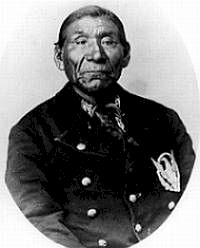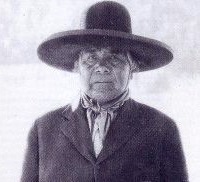
 He was chief of an Indian nation called the Piute and before any white
men came over the Rocky Mountains to disturb them, there were several
thousand Indians, to whom he was like a father. He saw to it that they
had plenty of good food to eat, nice furs and skins to wear, and
handsome tepees (or wigwams) for their families to live in. He had a
good wife and many children of his own; he was always very kind to them,
and took much pains to teach all he himself knew to his eldest son, who
was to be Chief Winnemucca after him.
He was chief of an Indian nation called the Piute and before any white
men came over the Rocky Mountains to disturb them, there were several
thousand Indians, to whom he was like a father. He saw to it that they
had plenty of good food to eat, nice furs and skins to wear, and
handsome tepees (or wigwams) for their families to live in. He had a
good wife and many children of his own; he was always very kind to them,
and took much pains to teach all he himself knew to his eldest son, who
was to be Chief Winnemucca after him.
Chief Winnemucca, also
called Poito or One Moccasin (ca. 1820–1882), was an important chief of
the Northern Paiute at the time of the Paiute War of 1860. He is
primarily known through the writings of his daughter, Sarah Winnemucca.
His birth date is unknown, but was probably around 1820.
Winnemucca has been translated as The Giver. This name is part-English
and part-Paiute His role in Northern Paiute politics is difficult to
determine, and somewhat controversial. Sarah Winnemucca stated that he
was the chief of all the Northern Paiute, and due in large part to her
role as a translator this viewpoint was shared by contemporary whites.
Modern historians and ethnologists view him more as a "first among
equals", with considerable influence over the bands in the Pyramid Lake
region.
Chief Winnemucca taught the Piute very different lessons
from other Indian chiefs; for example, to love peace and make constant
effort to keep it; always to be kind one to another; always to tell the
truth, and never to take for one's self what belonged to another; to
treat old people with tender regard; to care for and help the helpless;
to be affectionate in families and show real respect to women,
particularly to mothers; yet he and his Piute had no books, no writing,
no chairs, no furniture, almost none of those common articles that make
our houses so comfortable. Chief Winnemucca, from time to time, had
wonderful dreams. One night he dreamed that some people who were
different from the red men, would by and by come from the east; that
they would be finer people than any he had ever seen, and that their
faces would he of a white color, bright and beautiful. He stretched out
his hands toward them and, said: "My white brothers!"
Beside the
beautiful lake he lived for many years, and when at last he was about to
pass over to the Happy Land he called his son to him and told him never
to forget his duty to his own people and to love and always be kind to
his white brothers.
The San Francisco Chronicle reported that
Winnemucca died in October 1882 at Coppersmith Station, Nevada. It
further reported that his death was attributed to his being bewitched by
his young wife, who was then stoned to death along with their
three-year-old child.
Sarah Winnemucca, whose Paiute Indian name was Thocmetony or Shell
Flower, died at her sister's home in Henry's Lake, Nevada on October 14,
1891. Winnemucca was the first Native American woman known to secure a
copyright and to publish in the English language. Her book, Life Among
the Piutes: Their Wrongs and Claims, is an autobiographical account of
her people during their first forty years of contact with explorers and
settlers.
Born "somewhere near 1844" in the Humbolt River and
Pyramid Lakes area of western Nevada, Sarah Winnemucca was the daughter
of Chief Winnemucca (Po-i-to) of the Northern Paiute people. Her
grandfather, Chief Truckee (possibly Tru-ki-zo in Paiute) guided John C.
Frémont during his 1843-45 survey and mapmaking expedition across the
Great Basin to California. The friendships which Chief Truckee formed
with the Frémont party provided an opportunity for his granddaughter to
be educated in the household of William Ormsby of Carson City. Sarah
Winnemucca soon became one of only two Paiutes in Nevada able to read,
write and speak English. At the behest of her grandfather she became a
translator for the U.S. Army and, later, for government Agents at
Malheur Reservation, designated a reservation for the northern Paiute by
a series of Executive Orders issued by President U. S. Grant. Later she
served in this same capacity at the Yakima Reservation.
 Wovoka ('The Cutter'). A Paiute dreamer and medicine-man, and originator
of the Ghost dance; born in west Nevada about 1856. His fattier, Tavibo,
'White Man,' was also a reputed medicine-man, and the son may have
inherited the mystic tendency from him. After his father's death the boy
was taken into the family of a white rancher from whom he received the
name of Jack Wilson, by which he was commonly known among the whites. He
was still alive in 1905, but had lost in large measure his former
influence.
Wovoka ('The Cutter'). A Paiute dreamer and medicine-man, and originator
of the Ghost dance; born in west Nevada about 1856. His fattier, Tavibo,
'White Man,' was also a reputed medicine-man, and the son may have
inherited the mystic tendency from him. After his father's death the boy
was taken into the family of a white rancher from whom he received the
name of Jack Wilson, by which he was commonly known among the whites. He
was still alive in 1905, but had lost in large measure his former
influence.
Copyright © 1996 - The USGenWeb® Project, IDGenWeb